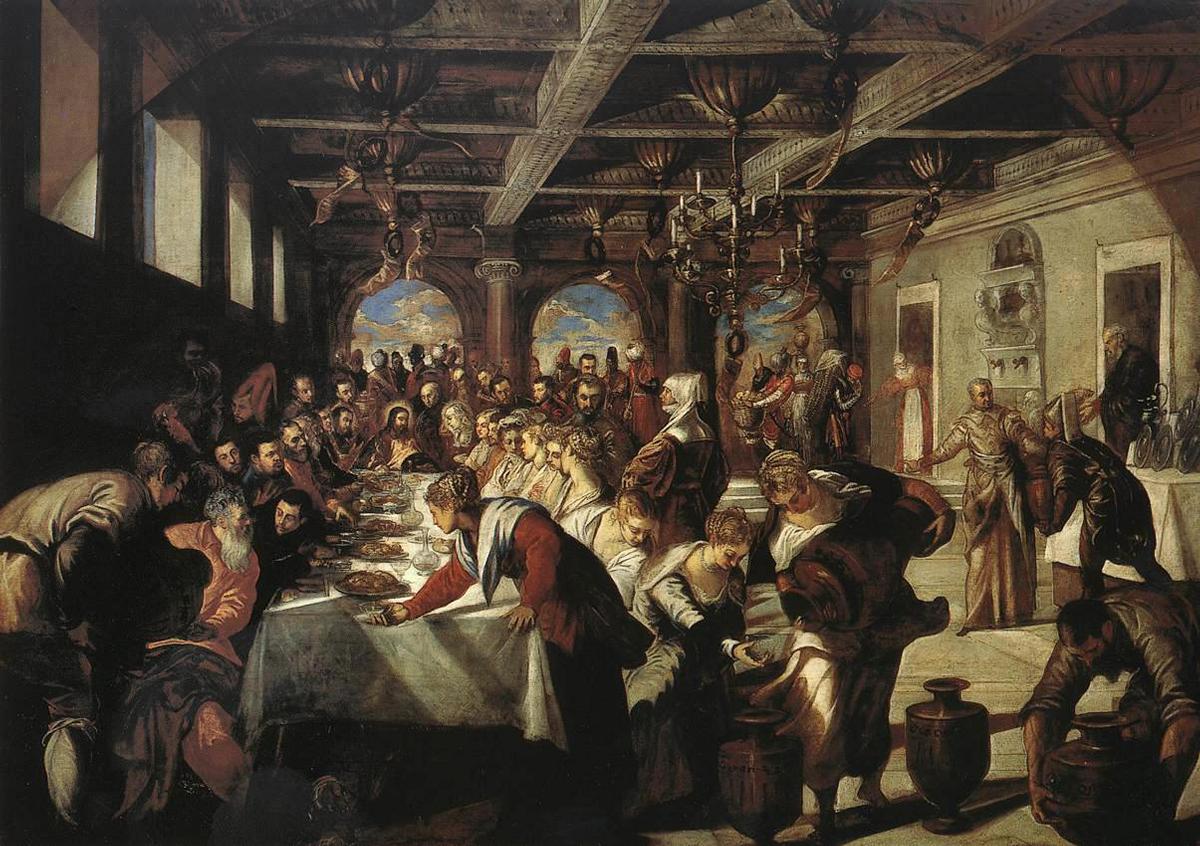January 1: Rich Celebration
♫ Music:
Day 33—Thursday, January 1
This is the Lord’s doing;
It is marvelous in our eyes.
This is the day which the Lord has made;
Let us rejoice and be glad in it.
Psalm 118:23-24
RICH CELEBRATION
In The Wedding Feast Tintoretto offers us one of his typically dynamic, even chaotic, scenes. His powerful use of perspective pulls this cavernous, opulent room back away from us. Every person in the painting, even if seated at the table, is powerfully animated. In the middle of this ebullient energy, Christ performs his first miracle. Transforming the water into wine in the midst of a wedding feast, Jesus signals that that the bridegroom has come. The feast, which has been going on for some time now, is made full, heightened by his work and by his presence.
Jesus was responding to a particular need in the moment, as nearly all his miracles did—there was a shortage of wine and more was needed—and he was simultaneously operating in his prophetic power. In the last hours before his death, at the Last Supper, he would identify himself with the wine. Even as his first miracle brought fullness where there was lack, his greatest work would come when he was poured out as a libation.
Tintoretto seems to relish the premonition of the last supper within the wedding feast. Tintoretto makes clear reference to Leonardo da Vinci’s Last Supper in the construction of this painting. The three arches on the back wall update the three windows in the back of the room in Leonardo’s earlier work. Rather than centering Christ in middle archway, Tintoretto shifts Christ off to the left, but retains the head of Jesus, just as Da Vinci did, as point of convergence for all of the architectural lines in the room. Tintoretto has thus embedded, through pictorial allusion, the Last Supper within the Wedding Feast.
Jesus’ imagistic prophecy at Cana does not stop at the Last Supper, but extends beyond into the great Wedding Feast of the Lamb. After being poured out, he will be miraculously filled again, and so shall we. Perhaps in the opulence of the room depicted by Tintoretto, with its ionic columns and ornate appointments, the artist is reminding us of this greater feast that awaits all of us. At that magnificent wedding feast we will drink wines superior to any we have ever tasted, enjoy food with flavors and textures we never thought possible, have conversations that nourish and bring us deep joy. Think of all of the pleasures you have had in your Christmas celebrations: the delighted laughter of children, the tearing of wrapping paper, dark chocolate melting on your tongue, good drink, delicious food. Do you not know that this is only the hundredth part of secret treasures Christ has laid up for us?
Why do you mourn when the bridegroom is with you?
Jonathan Puls, Art Department
Wedding Feast at Cana
Tintoretto
1561
Church of Santa Maria della Salute, Venice, Italy
Oil on canvas
About the Art and Artist
Born Jacopo Comin, Tintoretto (1518 – 1594), was the eldest of 21 children born to a fabric dyer in Venice. He was already showing artistic talent in his youth, so his father took him to the studio of Titian to see if he could be trained. Titian sent Tintoretto home after only ten days; the reasons for this can only be supposed, but it is assumed that Titian regarded regard Tintoretto as too independent an artist to be a promising pupil. By 1548, Tintoretto was already a prolific painter. Some of his paintings for Venice churches are still in existance. The Wedding Feast at Cana, which depicts Jesus’ earliest miracle in the Bible, was originally painted for the rectory of the Convent of Crociferi in Venice.
About the Music
Let All that are to Mirth Inclined Lyrics
Recorded at Glenstal Abbey, Ireland
Let all that are to mirth inclined
Consider well and bear in mind
What our good God for us has done
In sending his beloved Son
For to redeem our souls from thrall
Christ is the savior of us all
The twenty-fifth day of December
We have good cause to remember
In Bethlehem upon that morn
There was a blessed Messiah born
But mark how all things came to pass
The inn and lodgings filled was
That they could find no room at all
But in a straw-filled ox’s stall
Near Bethlehem some shepherds keep
Their flocks and herds of feeding sheep
To whom God’s angels did appear
Which put the shepherds in great fear
With thankful heart and joyful mind
The shepherds went this babe to find
And as the heavenly angel told
They did our savior Christ behold.
Three eastern wise men from afar
Directed by a glorious star
Came boldly on and made no stay
Until they came where Jesus lay
And being come unto that place
Where the blessed Messiah was
They humbly laid before his feet
Their gifts of gold and incense sweet
See how the Lord of heaven and earth
Showed himself lowly in his birth
A sweet example for mankind
To learn to bear an humble mind
Let all your songs and praises be
Unto his heavenly majesty
And evermore amongst our mirth
Remember Christ our Savior’s birth
About the Performer
Loreena Isabel Irene McKennitt (b. 1957) is a Canadian musician, composer, harpist, accordionist, and pianist who writes, records, and performs world music with Celtic and Middle Eastern themes. McKennitt is known for her refined and clear dramatic soprano vocals. She has sold more than 14 million records worldwide.
http://loreenamckennitt.com
